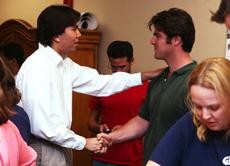It was not quite the drama voters have come to expect of student government – no one cried, unlike ASUA elections – but the Graduate and Professional Student Council elections last night yielded over 600 total votes, double the turnout of last year.
Hot button issues such as the current state budget crisis were what probably put the election over the edge and gained the attention of UA graduate students, GPSC officials said.
“”It’s a challenging year; this past year’s been really busy,”” said Graduate College Dean Andrew Comrie. “”And I don’t think it’s going to change a whole lot this coming year. The roller coaster ride with the budget is not over by any stretch.””
Unlike their undergraduate counterparts at the Associated Students of the University of Arizona, GPSC elects its representatives based on colleges. Each college elects its own representatives, and colleges are given one elected official per 400 graduate students.
Although most of the 32 representative GPSC positions either went vacant or held candidates running unopposed, contested elections in three colleges left some representative hopefuls holding their breaths until the results were announced.
College of Humanities Candidate Lucy Blaney battled hard against opposing candidate Courtney Johnson, and the 20 percent voter turnout – the highest of any college – chose Blaney as their elected representative, 72-19.
Blaney attributed the voter turnout to “”me and Courtney both personally harassing individuals into voting.””
Blaney sent out 176 campaign emails, as candidates are not allowed to send bulk emails or contact through listservs.
In order for College of Humanities students to communicate efficiently between the different departments, Blaney is looking to formulate some kind of Humanities governing body.
“”It’s very easy for graduates to get so buried in their own work that it’s hard for them to see the big picture and how the departments interact with each other, et cetera,”” she said. “”I think communication system breakdown is the most damaging thing that could possibly happen to us. The more we can communicate and unify across departments, the stronger a voice we’ll be.””
The College of Engineering’s Brenda Gonzalez was a little less sure of herself going into the elections.
“”I didn’t think I would make it, literally,”” she said.
The candidate turned representative-elect was eventually able to breathe a sigh of relief as her name was called as the leading vote receiver for her college over her two competitors, 54-51-28.
“”Good, good – it feels so good,”” Gonzalez said.
The only other college with a contested election was the College of Science, which representative-elect Bryan Korth won handily over challengers Cory Christenson and Amy Lederle, 80-64-51.
For some who had already wrapped up their unopposed positions, election night was about conveying a message of strength and unity, rather than waiting out a vote.
President-elect David Talenfeld, knowing his spot as the next president was secured, began shadowing current GPSC president Stephen Bieda several weeks ago and wasted no time outlining his future plans to his newly-elected comrades.
“”I know there’s never been a more critical time for us to renew our dedication to the university,”” Talenfeld told the representatives who packed the GPSC offices in the Student Union Memorial Center. “”Recent events have demonstrated that we need to train a new crop of better informed leaders in this state, because the ones we have are pretty myopic in a lot of ways.””
A key goal for GPSC moving forward will be to mobilize students to take part in the council’s interaction with Capitol Hill as university officials and students grow impatient with the budget crisis, Talenfeld said.
“”Communication’s been a tremendous challenge for graduate students,”” he said. “”But we’ve got a tremendous pool of talented (representatives) … and I have every confidence in the improved participation we have now.””
GPSC election night was a bittersweet one for Bieda. On one hand, the current president was able to witness the hard work of his newly-elected peers pay off. On the other, it puts Bieda one day closer to his final days in office, leading up to the beginning of the new representatives’ terms on April 22.
“”It’s kind of a surreal moment for me to get ready to leave … but it has been an honor,”” Bieda said. “”It has been a pleasure, and I look forward to seeing what the council will do in the future.””









